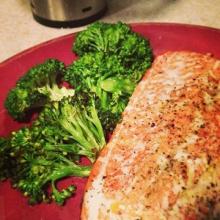 war against cancer, researchers have begun to focus on the promising results related to diet in reducing the risk of skin cancer. Foods rich in antioxidants like vitamins A, C, and E, beta-carotene and zinc can help protect your skin from cancer.
war against cancer, researchers have begun to focus on the promising results related to diet in reducing the risk of skin cancer. Foods rich in antioxidants like vitamins A, C, and E, beta-carotene and zinc can help protect your skin from cancer.Skin-friendly Foods
The list of skin-friendly foods is long, and while this list isn't exhaustive, it offers a great starting point for eating for skin health.
Fish
Fish, especially salmon, offers nutrients for healthy skin. Salmon is a very good source of protein and is low in sodium. It is also rich in Thiamin, Niacin, Vitamin B6 and Phosphorus, vitamin B12 and Selenium.
Legumes
Beans and lentils are an excellent source of vitamin C, but are also good source of vitamin B6, Pantothenic Acid, Iron, Magnesium, Phosphorus and Potassium. These small but nutrient-packed vegetables are also a very good source of Thiamin, Riboflavin, Niacin, Folate, Copper and Manganese.
Carrots
Carrots are a good source of dietary vitamins A and C as well as vitamin K and Potassium. Along with being a good source of antioxidants, carrots offer Thiamin, Niacin, vitamin B6, Folate and Manganese.
Apricots
|
Apricots make an ideal choice for a sweet snack. They are a very good source of vitamins A and C and a good source of dietary fiber and Potassium.
Pumpkin
Don't limit pumpkin to pies. Use it in casseroles or as a side dish for a good source vitamin E, dietary fiber, vitamin A, and vitamin C. You'll also benefit from nutrients including Thiamin, Niacin, vitamin B6, Folate, Iron, Magnesium, Phosphorus, Riboflavin, Potassium, Copper and Manganese.
Broccoli
Broccoli is often eaten for weight loss but it is also a good source of vitamin E and a very good source of vitamin A and vitamin C. Along with these antioxidants it is also a good source of protein, Thiamin, Riboflavin, Pantothenic Acid, Calcium, Iron, Magnesium, Phosphorus, Selenium, and a very good source of dietary fiber, vitamin K, vitamin B6, Folate, Potassium and Manganese. Steamed broccoli makes an easy side dish, and it works well in casseroles, too.
Cabbage
Cabbage is known as a low-calorie choice, but it is also rich in vitamin C, dietary fiber, vitamin K, vitamin B6, Folate and Manganese. It's also a good source of Thiamin, Calcium, Iron, Magnesium, Phosphorus and Potassium.
Chard
It's no secret that leafy greens are good for you, but when eating to protect your skin, chard offers a power punch with vitamins A, C, and E. Along with these antioxidants, chard is also a good source of Thiamin, Folate and Zinc, and is a very good source of dietary fiber, vitamin K, Riboflavin, vitamin B6, Calcium, Iron, Magnesium, Phosphorus, Potassium, Copper and Manganese.
Spinach
Spinach has a reputation for building strong muscles, but it is also a very good source of vitamins A, C, and E. Other nutrients include: Niacin, Zinc, protein, vitamin K, Thiamin, Riboflavin, vitamin B6, Folate, Calcium, Iron, Magnesium, Phosphorus, Potassium, Copper and Manganese.
When eating a diet to fight skin cancer, experts agree it should consist predominately of a plant-based diet. Along with the above list, foods that contain flavonoids and resveratrol such as tomatoes, apples, blueberries, cherries and grapes, as well as wine and dark chocolate have also demonstrated protective qualities against skin cancer.





